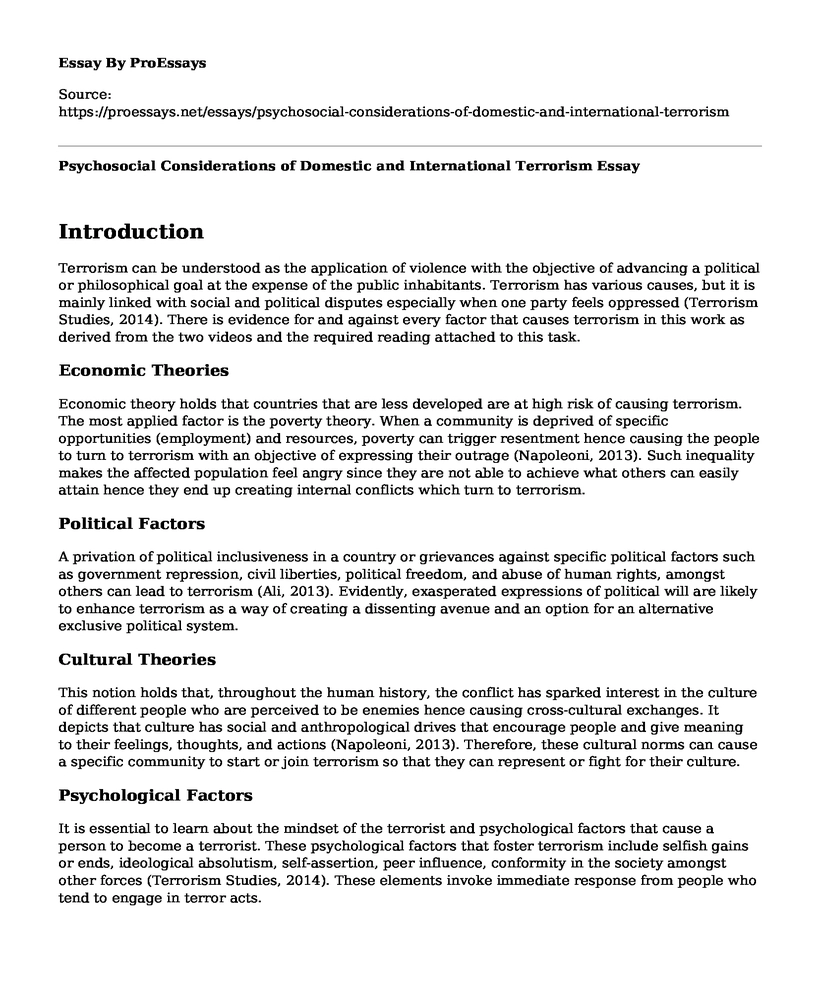Introduction
Terrorism can be understood as the application of violence with the objective of advancing a political or philosophical goal at the expense of the public inhabitants. Terrorism has various causes, but it is mainly linked with social and political disputes especially when one party feels oppressed (Terrorism Studies, 2014). There is evidence for and against every factor that causes terrorism in this work as derived from the two videos and the required reading attached to this task.
Economic Theories
Economic theory holds that countries that are less developed are at high risk of causing terrorism. The most applied factor is the poverty theory. When a community is deprived of specific opportunities (employment) and resources, poverty can trigger resentment hence causing the people to turn to terrorism with an objective of expressing their outrage (Napoleoni, 2013). Such inequality makes the affected population feel angry since they are not able to achieve what others can easily attain hence they end up creating internal conflicts which turn to terrorism.
Political Factors
A privation of political inclusiveness in a country or grievances against specific political factors such as government repression, civil liberties, political freedom, and abuse of human rights, amongst others can lead to terrorism (Ali, 2013). Evidently, exasperated expressions of political will are likely to enhance terrorism as a way of creating a dissenting avenue and an option for an alternative exclusive political system.
Cultural Theories
This notion holds that, throughout the human history, the conflict has sparked interest in the culture of different people who are perceived to be enemies hence causing cross-cultural exchanges. It depicts that culture has social and anthropological drives that encourage people and give meaning to their feelings, thoughts, and actions (Napoleoni, 2013). Therefore, these cultural norms can cause a specific community to start or join terrorism so that they can represent or fight for their culture.
Psychological Factors
It is essential to learn about the mindset of the terrorist and psychological factors that cause a person to become a terrorist. These psychological factors that foster terrorism include selfish gains or ends, ideological absolutism, self-assertion, peer influence, conformity in the society amongst other forces (Terrorism Studies, 2014). These elements invoke immediate response from people who tend to engage in terror acts.
References
Ali, M. (2013). The link between unemployment and terrorism. Retrieved March 08, 2018, from http://www.ted.com/talks/mohamed_ali_the_link_between_unemployment_and_terrorism.
Napoleoni, L. (2013). The intricate economics of terrorism. Retrieved March 08, 2018, from https://www.ted.com/talks/loretta_napoleoni_the_intricate_economics_of_terrorism
Terrorism Studies FreeBook - Routledge. (2014). Retrieved March 08, 2018.
Cite this page
Psychosocial Considerations of Domestic and International Terrorism. (2022, Apr 04). Retrieved from https://proessays.net/essays/psychosocial-considerations-of-domestic-and-international-terrorism
If you are the original author of this essay and no longer wish to have it published on the ProEssays website, please click below to request its removal:
- Cellphone Usage and Attention While Driving Essay
- Mental Health Problem in the United States Paper Example
- Five Counselling Models of Integrating Spirituality Essay Example
- Research Paper on Mental Disorders and Illnesses
- Improving Rumination and Decreasing Symptoms of Depression - Essay Sample
- The Influence of Parental Style on Adolescent Behavior Essay Example
- Georgia Suicide Prevention: Evaluating Involuntary Commitment's Effectiveness - Essay Sample







